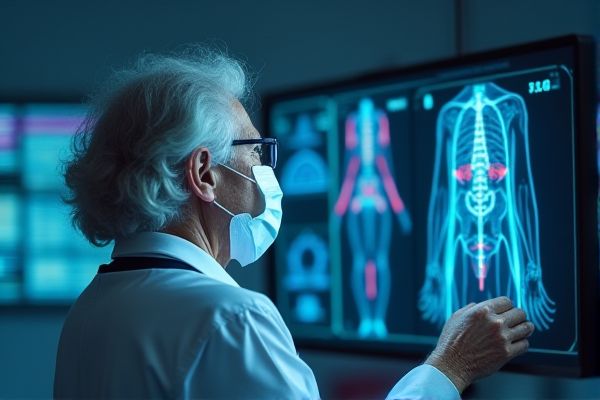
AI-powered monitoring systems enhance the safety of elderly individuals by providing real-time alerts for falls or emergencies. Virtual health assistants offer personalized medication reminders and health advice, helping seniors manage their conditions effectively. Cognitive training programs using AI stimulate mental engagement, promoting memory retention and cognitive function. Robotics are increasingly used for companionship and assistance with daily tasks, reducing loneliness and improving quality of life for seniors.
AI usage in elderly care innovations
Proactive Health Monitoring
AI can enhance proactive health monitoring in elderly care by analyzing data from wearable devices to detect health issues early. For instance, institutions like Brookdale Senior Living use AI systems to monitor patients' vital signs and overall wellness. This technology may improve response times to medical emergencies, potentially reducing hospitalizations. The chance of creating personalized care plans tailored to individual needs increases, thereby enhancing the quality of life for seniors.
Fall Detection Systems
AI innovations in elderly care, such as fall detection systems, can significantly improve safety and responsiveness. These systems use sensors and algorithms to alert caregivers instantly when an elderly individual falls, potentially reducing response times and preventing severe injuries. By integrating AI with wearable technologies, there is a chance of enhancing the quality of life for seniors while providing peace of mind to their families. Institutions like healthcare facilities and home care services are increasingly adopting these technologies to optimize care delivery.
Medication Management
AI applications in elderly care innovations have the potential to enhance medication management significantly. For instance, systems can utilize machine learning algorithms to predict when seniors are likely to miss a dose based on historical data. By providing timely reminders and monitoring adherence, these tools can improve overall health outcomes and reduce hospitalizations. Institutions like nursing homes may benefit from implementing such AI-driven solutions for more efficient care delivery.
Intelligent Virtual Assistants
The implementation of Intelligent Virtual Assistants in elderly care can enhance daily living by offering companionship and support. For instance, tools like Amazon Alexa can facilitate medication reminders and emergency assistance. Such technologies can potentially reduce loneliness and improve the quality of life for seniors living alone. There is a significant opportunity for institutions focused on geriatric care to integrate these innovations, creating a more supportive environment for the elderly.
Personalized Care Plans
AI in elderly care enables the development of personalized care plans that cater to individual needs. For instance, institutions like AARP are exploring how machine learning can analyze health data to suggest tailored interventions. This approach may enhance the quality of care and improve the overall well-being of seniors. The potential for AI to streamline care processes and optimize resource allocation presents significant advantages in this sector.
Emotion Recognition Technology
Emotion recognition technology in elderly care can enhance the understanding of residents' feelings, potentially leading to improved mental health outcomes. By integrating this technology into facilities like assisted living homes, caregivers may better respond to the emotional needs of their residents. AI-driven solutions can also help identify patterns in mood changes, which might indicate underlying health issues. The incorporation of such innovations can create a more supportive and responsive environment for the elderly.
Social Engagement Solutions
AI technologies can significantly enhance social engagement solutions for the elderly, offering opportunities for improved well-being. For instance, platforms like GrandPad utilize AI to facilitate easy communication with family and friends. These innovations may reduce feelings of isolation and promote active participation in community activities. The potential for personalized care plans through AI-driven insights in elderly care settings remains a promising advantage.
Cognitive Training Applications
AI technologies in elderly care can enhance monitoring and support systems, offering personalized assistance. Cognitive training applications, like brain games, may improve mental acuity and delay cognitive decline among seniors. Institutions focused on geriatric health can leverage these tools to create tailored programs that meet individual needs. The potential for better quality of life through increased engagement and cognitive stimulation is significant.
Mobility Assistance Devices
AI technologies in elderly care could enhance the efficiency of Mobility Assistance Devices, potentially improving the quality of life for older adults. For instance, smart walkers equipped with AI can analyze user movements and adapt to their specific needs, offering personalized support. The integration of AI may also enable predictive maintenance, reducing downtime and ensuring devices are always functional. These advancements present a promising opportunity to increase independence and safety among the elderly population.
Data-Driven Decision Support
AI can enhance elderly care innovations by providing real-time monitoring and personalized support, which might improve the overall quality of life for seniors. Data-driven decision support systems can analyze patterns in health data, allowing institutions like Oakwood Senior Living to allocate resources more effectively. These tools may also help caregivers anticipate needs and respond promptly, minimizing potential risks. With ongoing advancements, the chance for AI to improve operational efficiency in elderly care remains significant.
 techknowy.com
techknowy.com